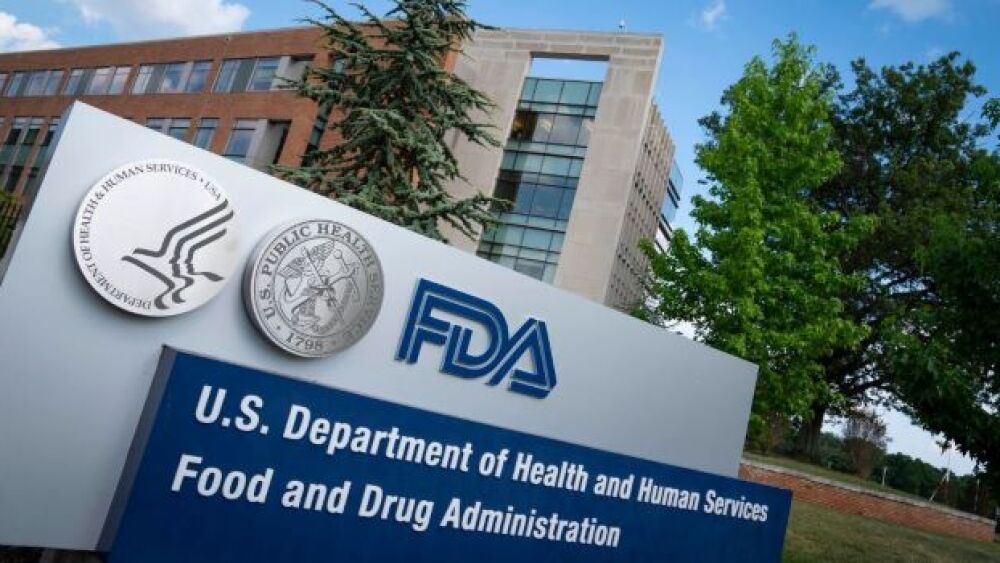The FDA presented briefing documents Monday outlining what it called “uncertainties” in the data presented by Veru regarding its COVID-19 antiviral. An advisory committee will meet Wednesday.
Sarah Silbiger/Getty Images
Despite an FDA review team flagging potential “uncertainty” in data presented by Veru, Inc. for a COVID-19 antiviral drug, the issues may not be enough to derail potential Emergency Use Authorization.
On Monday, the FDA presented briefing documents outlining a number of red flags in the data presented by Veru, including a high placebo mortality rate and uncertainty in the identification of a clinically relevant patient population.
Despite the issues, which the regulatory agency called “uncertainties,” the FDA staff noted that none of the issues that have been raised invalidate the mortality benefit observed in the clinical trial in the company’s filing.
The briefing documents were released ahead of a Wednesday meeting of the Pulmonary-Allergy Drugs Advisory Committee that is expected to weigh the merits of the data from Veru’s Phase III trial.
Committee members will weigh the overall clinical data before potential EUA.
Without harsh condemnation of the Phase III results, shares of Veru soared Monday to close at $14. The stock continued to see some momentum in premarket trading Tuesday. Shares were up more than 3% ahead of the opening bell.
The company declined to comment on the FDA briefing materials ahead of the advisory committee meeting, Hannah Gendel, manager of corporate communications at Veru, told BioSpace.
In July, Veru posted positive Phase III data that showed sabizabulin, a novel dual antiviral and anti-inflammatory agent, generated a 55% reduction in deaths in moderate-to-severe hospitalized patients compared to placebo.
COVID-19 infections treated in the study included the Delta and Omicron variants. The company announced the results were both statistically significant and clinically meaningful.
Sabizabulin is being developed for the treatment of hospitalized moderate to severe COVID-19 patients at high risk for acute respiratory distress syndrome.
Sabizabulin also hit its secondary endpoints. The data showed the treatment led to significant reductions in the number of days patients spent in the intensive care unit, days spent on mechanical ventilation and total hospital days.
During Infectious Disease Week 2022 in October, Veru CEO Mitchell Steiner presented trial data from a subset of hospitalized COVID-19 patients who required supplemental oxygen and had at least one comorbidity.
The data shared at the conference showed treatment with sabizabulin led to statistically and clinically meaningful reductions in clinical progression and deaths, Steiner said.
The Phase III study included 210 patients who were hospitalized with moderate to severe COVID-19. The patients received sabizabulin plus standard of care treatment or placebo plus standard of care, which included remdesivir, dexamethasone, anti-IL6 receptor antibodies and JAK inhibitors.
Other uncertainties the FDA raised included:
- Baseline imbalances in standard-of-care therapies
- Potential for unblinding events with enteral tube administration
- Uncertain effects of goals of care decisions on all-cause mortality
- Negative studies with other microtubule disruptors in COVID-19
- Differences in hospitalization duration prior to trial enrollment
While the agency scientists said these imbalances on their own do not invalidate the mortality benefit seen in the trial, when they are all taken together, these instances raise questions about the results.
Even with an objective endpoint such as mortality, FDA representatives said the results in the study could be subject to biases in a small trial of short duration in critically ill patients.
“We conducted sensitivity analyses to investigate the potential impact of the noted imbalances. However, these analyses cannot eliminate the concern that certain baseline imbalances across treatment groups may have impacted study outcomes, due to the small study size,” according to FDA’s briefing documents.





